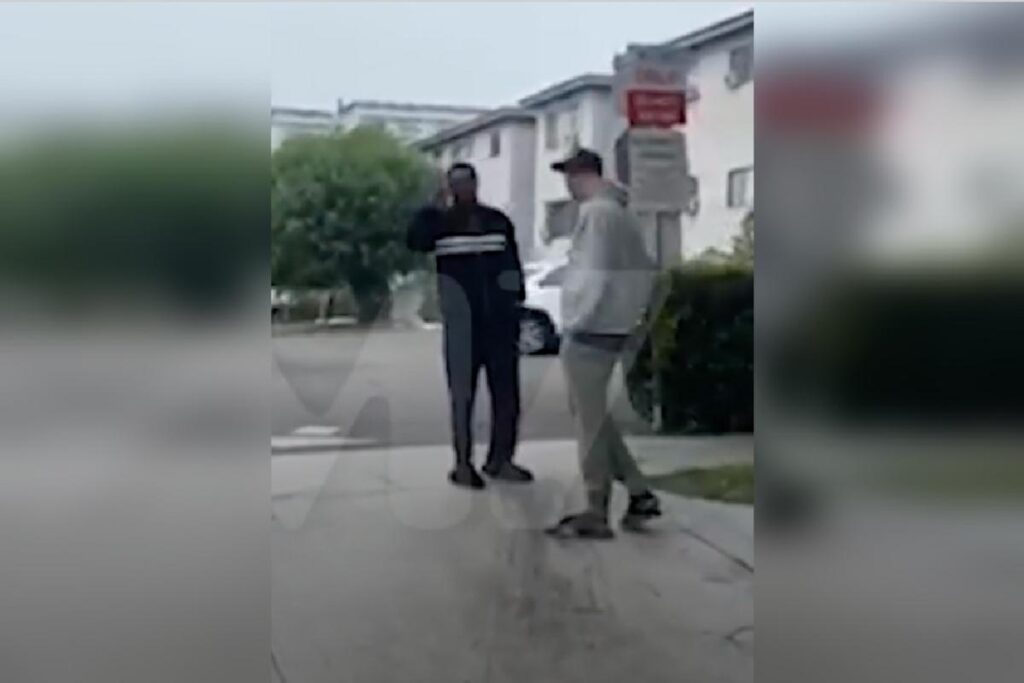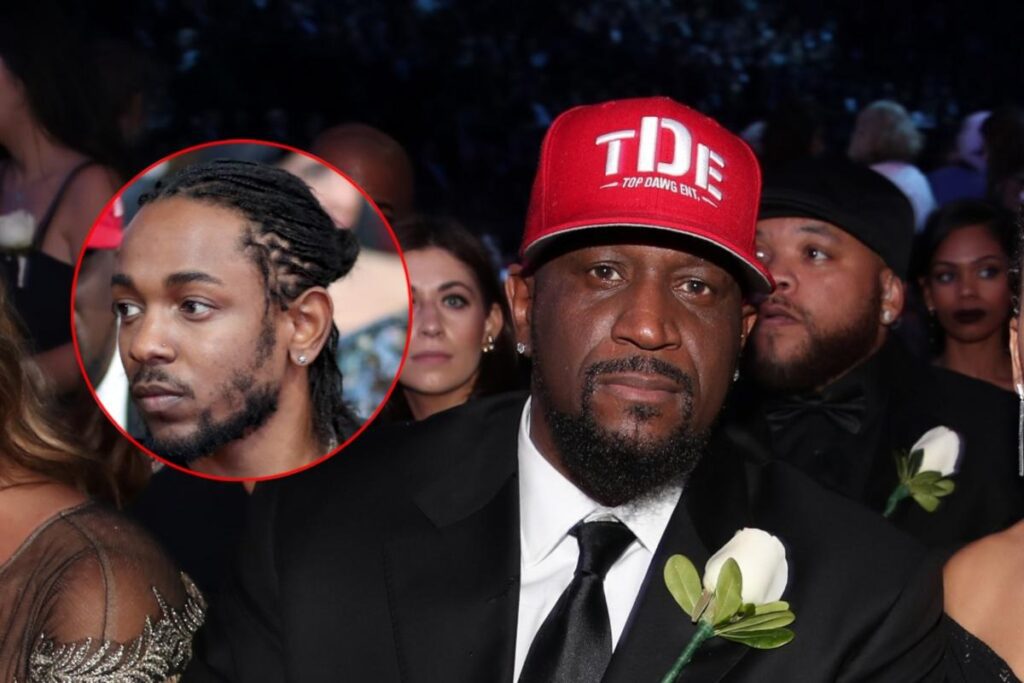We have no actual proof of this, you understand, and it’s therefore merely random speculation, an unproven theory with no solid facts to back it up. But—if you’re a believer in all things eerie, inexplicable and otherworldly, or at least the classic Oscar Wilde novella of the same name—it seems quite possible that Paul Weller might have a creepy Dorian Gray portrait hidden somewhere on his British estate, its image rapidly aging while his, at nearly 63, stays inordinately young. After all the showbiz wear and tear he’s survived since launching his legendary mod-retro outfit The Jam in the mid-’70s, before streamlining his tastes into a jazzier, more soulful Style Council from ’83 to ’89 and then flying solo afterwards with a volley of diverse solo sets leading up to his new ear-candy-effervescent Fat Pop, out today (May 14), the man affectionately known as The Modfather hasn’t changed too much since his punk-era genesis. His once-dark signature shag haircut may have turned a becoming silver a few years back, but—as clarified in new interview footage of him in Lee Cogswell’s informative 2020 documentary on The Style Council, Long Hot Summers—he still looks fairly untouched by the withering hands of time.
Okay, we’re kidding. But only sort of. And Weller, phoning last week from his home in London, readily laughs at the possibility of some hideous, face-melting Dorian Gray oil painting scaring the household mice in his attic somewhere. And he’s pleased with the roundabout compliment. “Bless you,” he says, but pauses to think about it. “I dunno, I saw myself on TV the other night when I did this show, and jeez! I couldn’t stop thinking how old I looked, and how my face is looking more and more like a carrier bag!,” he adds, compulsively. “So that’s the price of life, I guess. But hey, inside I’m still young, and that’s the main thing!” Over his four-plus decades in rock, this stylish icon has: won four BRIT Awards; launched his own line of ’60s-chic men’s clothing; and influenced several generations of younger musicians, like Oasis. In fact, just last week Oasis anchor Noel Gallagher, in a livestreamed show from his home studio, featured Weller (waiving his guitar for pounding keyboards) and his longtime band (guitarist Steve Cradock, bassist Andy Crofts, and drummer Ben Gordelier), playing the flagship Fat Pop single “Shades of Blue.” It’s a bouncy, summery romp that he co-wrote with his eldest daughter Leah, who sings on the number, as well.
The rest of the new Weller disc—written and recorded after pandemic lockdown, and arriving only a year after his last album, On Sunset—is equally immediate and feel-good simplistic, like the New Wave-buzzing opener “Cosmic Fringes,” a gravelly rocker called “True,” the funky perambulator of a title track, a bluesy celebration of marriage, “Glad Times,” the faux-Gospel “Testify,” and a chiming, ’70s-vintage ballad, “In Better Time.” The only anomaly is the funky, soulful stroll “That Pleasure,” a veiled protest anthem the singer penned after watching TV coverage of the suffocation of George Floyd last year at the hands of brutal police. Fortunately, Weller doesn’t have far to go when a song idea inspires him—he’s got a home studio he’s dubbed Black Barn outside of town, where he’s also begun producing younger artists who have caught his fancy. And the kids continue to seek him out, he marvels. Maybe because of all the street cred he amassed in The Jam, back when he was one of the only musicians brave enough to actually punch the late Sid Vicious when he confronted him. Or maybe thanks to all the remarkably diverse—often arcane—aesthetic influences that went into The Style Council. Or, more likely, just because then, as now, the man simply looks youthfully cool while doing it all. Painting or no Faustian-bargain painting.
Paste: Rick Nielsen from Cheap Trick recently related how happy he was to have tracked down a rare Epiphone Dwight Coronet guitar, one of only 47 originally made and the model that Steve Marriott used to play. And he said he bought it from you. How did he even know that you had one? And how does an overseas sale like that even take place?
Paul Weller: It is odd, yeah. I’m glad he’s happy with it—I was, too. But I think it came through a mutual friend. There’s a guy that he knows, an American fellow who’s a producer, because he’s the one who came down and picked it up. But I don’t remember all the details, to be honest. So any more I could not tell you—you’d have to ask his American contact.
Paste: In terms of visuals, the wispy opening credits of Guy Ritchie’s last masterpiece The Gentlemen are just stunning, backed by David Rawlings and Gillian Welch’s Gothic “Cumberland Gap.” But then he slams the film shut just as succinctly, with The Jam’s “That’s Entertainment” over the closing credits. It perfectly summarizes the whole movie.
Weller: Right. I’ve not seen the film, so I can’t say anything about it. And I don’t know Guy at all—I’ve met Guy a couple of times, but how it came about was, they just asked permission if they could use the song in their film, I think. But I’ve not seen the film, and I’ve only met him a couple of times at radio shows, so I don’t know him really well.
Paste: Bottom line, though—how many artists can just be referred to by last name alone these days? I’ve gotten pitches where you’re their classy adjective—“New Weller-produced album by … ” Just one moniker—that’s all you need now.
Weller: Ha! Well, I don’t know how to answer that one! But getting involved with younger talent? It just depends on if I like what they’re doing—if I like what they’re doing musically, and if I like them, or I feel like I can add something to it, then I’ll get involved, if I’ve got the time and stuff, obviously. So it just depends, really. Like I just did a record with Declan O’Rourke, and when he asked me, I said, “Are you sure? You sure you need me to produce it?” Because I think he’s good enough and knows enough to do it himself. But he insisted anyway, and it actually worked out really well—we’re both really happy with it. So it depends, man—depends if I’m even asked, really. And if I like it, and I feel like I can add something, then I’ll get involved.
Paste: Is there a secret Black Barn Batphone at your home studio where young hopefuls can ring for your assistance?
Weller: No, no—it’s nothing like that. And people just get in touch with me. And a lot of these people I’ve known anyway—I’ve worked with them at different times or at least played on the same bill with them. So I kind of already know lots of them anyway.
Paste: And your daughter Leah got onboard with you on this album. Had she been onboard before this?
Weller: She sang with me a few times, and she sang with me live a couple of times. And she also sang on a song called “Be Happy Children,” and it’s from an album from quite a few years ago called Sonik Kicks (from 2012, also featuring Graham Coxon, Sean O’Hagan and Noel Gallagher)—that was the first time she sang on one of my records. And with this new one, on “Shades of Blue,” she wrote the choruses for that song while I wrote the verses, and then she did the vocals. But she’s great, man, and she’s really getting her writing chops together as well. She’s working on an album at the moment, and Steve Cradock—who’s from Ocean Colour Scene and who’s played with me forever—is producing it, and I’m telling you, the songs are just great. She’s kind of found herself.
Paste: It seems like you’re based in London and in the country, too, where your studio is. How do you divide your time between the two?
Weller: Pretty much just like that, to be honest. London’s my home—that’s where I live. And it’s my family’s home. And then I come down to the studio—which is not far, it’s just an hour’s drive from London—but I come down there whenever I can, so I never get tired of whatever I’m working on, you know?
Paste: And in a recent interview, you admitted that you’ve actually learned to crochet during the pandemic?
Weller: Crochet? Ha! No, I haven’t at all, mate! I don’t know where that comes from. But you can’t believe everything I say, though!
Paste: How were you feeling when the pandemic hit? I like that you said the best career advice you ever got was from your mom—she told you to never stop working.
Weller: Or to just keep working. Yeah. And it was scary, you know? I mean, the prospect of not working for a year or however long it was going to be? And nobody really had any idea how long it was going to be, so that was pretty scary. And missing out on playing shows was kind of hard. But once I accepted that that’s what it’s going to be, once I accepted that, I just thought, “Well, I’ll use it positively and try to make a record during this time.” You know? Which is what I did, obviously, and that was about as much as I could do, really. So yeah, I was just trying to stay positive throughout this.
Paste: At the weirdest times during lockdown—5 a.m., 3 a.m.—the Style Council documentary, Long Hot Summers has been airing. And I don’t think most people have any clue just how musically deep you actually are, and what eclectic jazz, R&B, even classical influences went into that band.
Weller: Yeah, that was true, definitely. A lot of things went into that band, a lot of different influences, all sorts of things. Artistic things, cultural things—there were a lot of different influences in that group, and just like anything, Some people will get them and some people won’t. There’s really nothing that you can do about that. But we never let that cut into what we did.
Paste: Did you feel that The Style Council was somewhat under-appreciated?
Weller: At the time, yeah. But I’m just happy that now that the band’s sort of looked on in a different light. At the time it was really vilified and hated, especially in the press, the music press. So it’s nice to sort of see it turn ’round, really, and see the history books kind of getting restored. Because for the first three or four years or so, we were really popular—it was a big band in a lot of places. But it kind of got rewritten into the idea that no one liked us, which just wasn’t true. But I think it’s just been nice to see us get our props for some of it, anyways, through this great documentary that came out last year, which I thought was really well done. It just told a nice story, and of that time, too. It was in the ’80s, which was a really different time, but the film really showed that side of it. I really liked it.
Paste: And going back to what your mom said, I think it’s also true that if you do what you love, you will never work a day in your life.
Weller: Well, yeah. And I don’t remember her saying to me those exact words, but I do really like that saying. But my mom said to me, “Never stop working—something good will come out of it one day.” I don’t know why she said that, but I have no intention of doing that, anyway. So I think that’s pretty good advice. I certainly don’t feel the need to retire or anything. But then if I do, then that’s what will happen. And I’ll accept that if it comes.
Paste: But with this album—even with the George Floyd-Inspired track “That Pleasure”—you wanted short, immediate, in-your-face pop songs, right?
Weller: Right. With “That Pleasure,” that was just a very immediate reaction to what was going on withe the murder of George Floyd and the whole deal that ensued, so that was my immediate reaction to it, and what I thought about it. And I’m always kind of wary about writing those songs, because its’ a little hit and miss sometimes. But it just felt like something I had to do, and I used it to say what I wanted to say.
Paste: You would have laughed the last time we talked, watching me rewinding, fast-forwarding that damned Sherlock episode wherein you were credited with a guest role, until it finally hit me—“Oh — he’s the dead Roman soldier on the floor!” It took forever to figure it out.
Weller: Ha! And I think my acting days are over, man. I think it was a dead Viking, and as you know, there’s not much call for Vikings these days. So yes, I’m now yet another unemployed actor! But Martin [Freeman, acting chum who played Dr. Watson to Benedict Cumberbatch’s Sherlock Holmes] very graciously got me that little bit. I was bugging him for ages, like, “Come on, man! Get me on the show! I’ll be whatever you want me to be! I’ll do anything!” And, indeed, that’s what he did.
Paste: I always enjoyed how you used double entendre lyrical metaphors, like in your older song “The Cranes Are Back.” Visually, a listener would think birds, but it’s actually about the return of industry, clouding the city skyline. What metaphors are hidden on Fat Pop, if any?
Weller: Well, I don’t know if there are any or not, because I think it’s quite direct this time, a lot more straightforward, really. Maybe with “Still Glides the Stream,” but a lot of those lyrics are Steve Cradock’s, because we wrote that song together—I wrote the music and he had that lyric. But I like that song—I really like the metaphor that’s in it. But I’ve always kept my songs … well, I think my songs are pretty straight up, in my mind, anyway.
Paste: What’s “In Better Time” about?
Weller: It’s an older person speaking to a younger person who’s got problems, be it drugs or drink or whatever the problem is. So I suppose it’s like a parent speaking to their kid, or an older person trying to talk to someone younger about life. So it’s saying that it’s not really that bad—it’s about watching people—young people or anyone, I suppose—destroy themselves, and trying to sort of say to them, “Look—look beyond this timeline. This timeline is a dark period, but try to see beyond it, because there will come a time when things won’t be so dark.” So that’s the message of the song, really.
Paste: Have you ever thought of starting a column called Ask the Modfather?
Weller: [Chuckling] Nope! No, man—I don’t think I’d be the type to give advice, really.
Paste: But here’s the weirdest question—you actually have a trampoline adjacent to your studio. Why? It seems like you’re just courting danger with it.
Weller: Well, we’ve had very few accidents, I have to say. And we do try and practice on the trampoline whenever possible. But yeah, it’s mainly there for the band. And that’s where I send ’em when they mess up, man—if there’s any wrong beats or wrong notes in the studio, then they get sent to the trampoline for half an hour!




